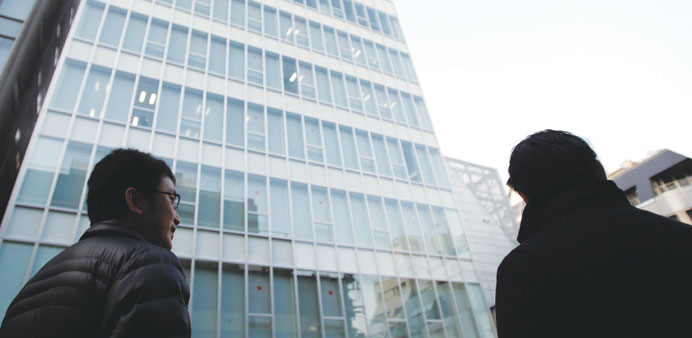Customers stand in front of a building housing the headquarters of Mt Gox in Tokyo. Digital currencies have come under scrutiny in markets from China to Russia and the US, with some regulators calling for bans or limits on their use.
Bloomberg/Singapore
Singapore will regulate virtual-currency intermediaries including operators of Bitcoin exchanges and vending machines to address potential money-laundering and terrorist-financing risks. The Monetary Authority of Singapore will require intermediaries that facilitate the exchange of digital currencies to verify identities of their customers and report suspicious transactions to a unit of the city-state’s police, it said in a statement yesterday. No timeframe was given.
Digital currencies have come under scrutiny in markets from China to Russia and the US, with some regulators calling for bans or limits on their use. Charlie Shrem, the founder of exchange company BitInstant, was charged in Manhattan two months ago with conspiring to launder $1mn of Bitcoins.
“Consumers and businesses should take note of the broader risks that dealing in virtual currencies entails and should exercise the necessary caution,” MAS Deputy Managing Director Ong Chong Tee said the statement. The new rules would make Singapore one of the first countries to target the risk of money laundering and terrorism financing among agents of virtual currencies, MAS said. In December, China’s central bank barred financial institutions from handling Bitcoin transactions following a surge in the currency’s value. Mt Gox, a Japanese exchange operator, collapsed last month following the loss of Bitcoins valued at more than $500mn.
The digital currency was introduced in 2008 by a programmer or group of programmers under the name Satoshi Nakamoto and has since gained traction with merchants around the world.
Bitcoins have no central issuing authority and use a public ledger to verify transactions.
Virtual currency intermediaries in Singapore will be subject to the similar rules that govern money changers and remittance businesses, MAS said.
The rules won’t cover the “safety and soundness” of the intermediaries or the transactions, it said.
The authority said it will monitor regulations in other jurisdictions and consider additional measures to address the risks posed by virtual currencies and their intermediaries.
“This really sets Singapore out as the global leader of virtual currency regulation,” said Antony Lewis, head of business development at itBit Pte, a Singapore-based virtual currencies exchange.
Mt Gox, once the world’s largest exchange for digital- currency transactions, went offline in Tokyo on February 25 after halting customers’ Bitcoin withdrawals. The exchange applied for bankruptcy protection three days later, saying it had lost 750,000 Bitcoins belonging to customers and 100,000 of its own.

